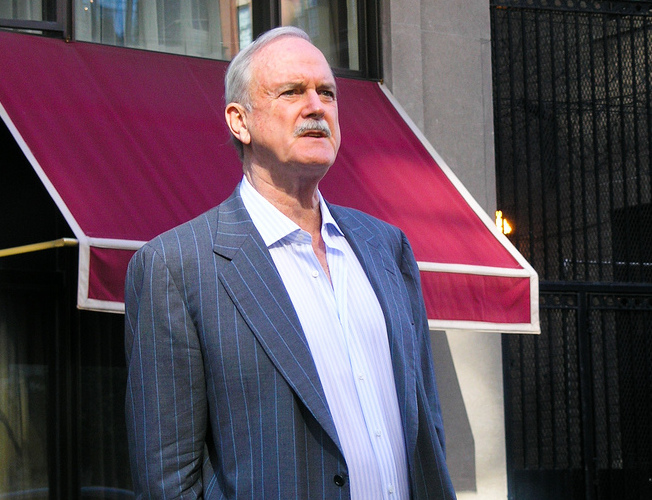
Creative Commons image by Paul Boxley
In his essay “The Relativity of Wrong,” Isaac Asimov argues persuasively against the common belief that “’right’ and ‘wrong’ are absolute; that everything that isn’t perfectly and completely right is totally and equally wrong.” Instead, he says, “it seems to me that right and wrong are fuzzy concepts,” and that certain ideas can be true in a sense, but still in need of further correction with new information. I can’t testify as to the strength of his argument when it comes to theoretical physics, but as far as basic inductive reasoning goes it seems perfectly sound to me, and a point worth making frequently. We don’t experience a world of binaries, but one full of “fuzziness” and near misses of all kinds.
As in science—argues former Monty Python member, comedy writer, and intellectual gadfly John Cleese—so in business. Cleese gave a motivational speech called “The Importance of Mistakes” in 1988 to an audience of 500 businessman at the British-American Chamber of Commerce, a demographic he has addressed remotely since 1972 with a series of business training videos made by his company, Video Arts. (“Better job training through entertainment,” as Kate Callen at UPI describes the company’s mission. Videos have titles like “Meetings, Bloody Meetings,” and “If Looks Could Kill.”)
In “The Importance of Mistakes,” Cleese explains that we do not veer wildly off course into total wrongness every time we make an error. Instead, our mistakes provide us with opportunities for feedback, which enables us to make course corrections, where we will inevitably make another mistake, receive more feedback, etc., until we hit the mark. These metaphors are not mine; Cleese uses a story called Gordon the Guided Missile as his primary example—which he dubiously claims was “the first nursery story I ever remember my mother reading to me”:
Gordon the guided missile sets off in pursuit of its target. It immediately sends out signals to discover if it is on the right course to hit that target. Signals come back: “No, you are not on course. So change it. Up a bit and slightly to the left.” And Gordon changes course as instructed and then, rational little fellow that he is, sends out another signal. “Am I on course now?” Back comes the answer, “No, but if you adjust your present course a bit further up and a bit further to the left, you will be.” He adjusts his course again and sends out another request for information. Back comes the answer, “No, Gordon, you’ve still got it wrong. Now you must come down a bit and a foot to the right.” And the guided missile goes on and on making mistakes, and on and on listening to feedback and on and on correcting its behavior until it blows up the nasty enemy thing. And we applaud the missile for its skill. If, however some critic says, “Well, it certainly made a lot of mistakes on the way”, we reply, “Yes, but that didn’t matter, did it? It got there in the end.” All its mistakes were little ones, in the sense that they could be immediately corrected. And as a results of making many hundreds of mistakes, eventually the missile succeeded in avoiding the one mistake which really would have mattered: missing the target.
The story illustrates, Cleese says, the importance of a “tolerant attitude towards mistakes”—even, a “positive attitude.” To take any other view would be to behave “irrationally, unscientifically, and unsuccessfully.” Cleese more or less recommends his audience adopt Asimov’s scientific perspective on error: mistakes are not disastrously irrecoverable missteps, but ways of learning how to get things “less wrong.”
Some clarification: Cleese means to validate only “those mistakes which, at the time they were committed, did have a chance.” A reasonably good try, in other words. There are some absolutes in the world, after all, and there are “true copper bottomed mistakes, like spelling the word ‘rabbit with three m’s or … starting a land war in Asia.” But the point stands. We’re usually in the realm of in-between, and instead of letting the anxiety of indeterminacy overwhelm us, Cleese recommends we take risks and “gain the confidence to contribute spontaneously to what’s happening,” thus overcoming inhibitions and the fear of looking ridiculous.
Cleese delivered this speech to a body of people not typically known for acting spontaneously. And while it seems to me that these days top executives can make egregious errors (or commit egregious fraud) and land squarely on their feet, I wonder if those on the tiers below have the privilege of daring to make errors in most industries. In any case, whether an assembly of corporate managers can afford to loosen up, the rest of us probably can, if we’re willing to adopt a “positive attitude” toward mistakes and consistently—scientifically, even—view them as opportunities to learn.
All of this requires a fine balance of the confidence to screw up and the humility to take constructive feedback when you do. “Healthy behavior actually arises out of confidence,” Cleese observed in an interview after his speech, and yet, “the worst problem in management—in fact, the worst problem in life—is the ego.”
Read many more excerpts from Cleese’s speech here.
Related Content:
John Cleese Explores the Health Benefits of Laughter
John Cleese’s Philosophy of Creativity: Creating Oases for Childlike Play
Josh Jones is a writer and musician based in Durham, NC. Follow him at @jdmagness


Excellent posting . We all manage life and enterprise through incremental mistakes and incremental course correction vis feedback loop . We need to make the most of tentative input to hit the target .